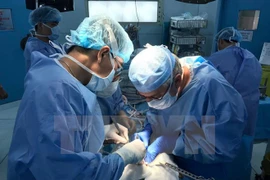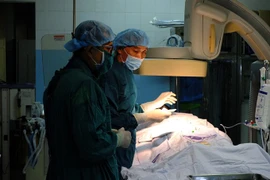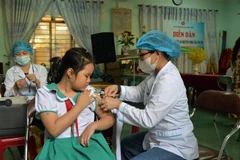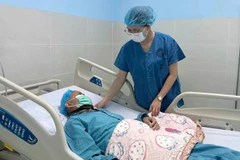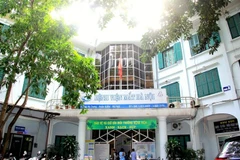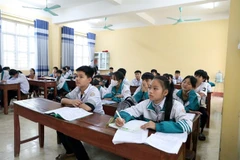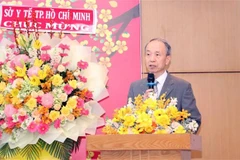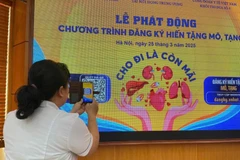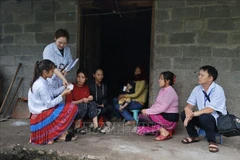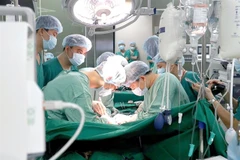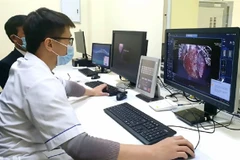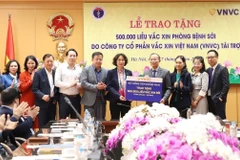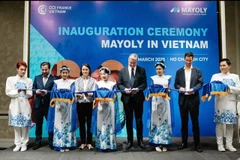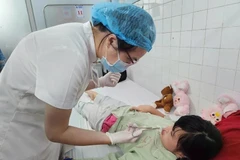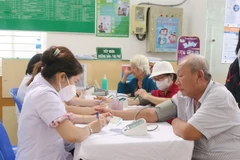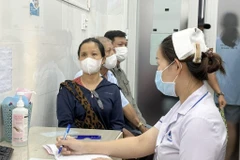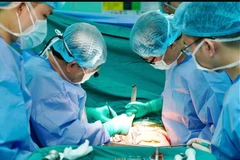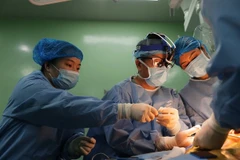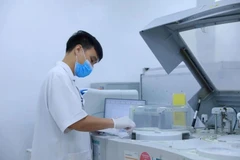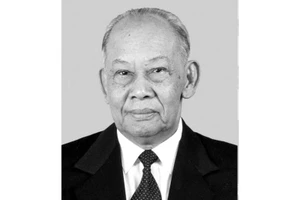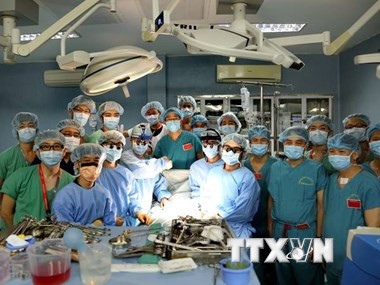 Many scientific and technological advancements were applied successfully in organ transplants in 2017. (Source: VNA)
Many scientific and technological advancements were applied successfully in organ transplants in 2017. (Source: VNA)Hanoi(VNA) – The Ministry of Health has announced the top ten events of Vietnam’smedical sector in 2017 as follows:
1. The Central Committee of the Communist Party of Vietnam issued Resolution No. 20-NQ/TW on enhancing the protection, care and improvement of public health and Resolution No. 21-NQ/TW on population work.
2. Wages of health workers included in costs of medical services
Wagesfor health workers were included in the costs of the medical services at publichospitals for the first time, contributing to improving the quality of healthexamination and treatment and increasing the coverage of health insurance tonearly 86 percent.
Inparticular, the pricing scheme creates conditions for hospitals to improve thequality of health services and to better serve insurance card holders whileencouraging grassroots hospitals to develop medical techniques to reduceoverloading at central hospital.
Thescheme does not affect policy beneficiaries, children under six years old orneedy people who receive state subsidy in health insurance.
3. Organisational apparatus streamlined
In2017, the health sector rearranged the medical system and streamlined theapparatus by merging medical centres without beds into provincial or municipaldisease control centres.
Eachprovince cut down an average five medical centres without beds and all 63provinces and cities nationwide are expected to reduce 315 medical centres,resulting in the elimination of at least 1,260 managerial positions in additionto the reduction of staffing and saving State funds.
4. Many scientific and technological advancements applied successfully in organ transplants
Doctors at the 103Military Hospital and the Vietnam Military Medical University worked withJapanese experts to perform the first human lung transplant in Vietnam on a6-year-old boy on February 21, 2017.
Ten-year-oldNguyen Thanh Dat became the youngest patient in Vietnam to receive a transplantedheart after a 10-hour surgery at the Vietnam-Germany Hospital in Hanoi on March15.
Cho Ray Hospitalset eight Vietnamese records in the transplant area recognised by the VietnamBook of Records, including “the first hospital to perform a kidney transplantfrom a brain-dead donor in Vietnam,” “the first hospital to carry out a kidneytransplant from a non-heart-beating donor in Vietnam" and "the unitperforming the most kidney transplants in Vietnam."
5. Creation of personal health records atcommune health stations and implementation of the grassroots health carepromotion project
Forthe first time, individual health records associated with universal healthinsurance were established in 2017. Up to 78 percent of more than 11,400commune-level health stations had doctors, making it easier for the managementof personal health records. The establishment of personal health records andthe coverage of health insurance for all people will be one of the steps tocarry out comprehensive health care at the grassroots level.
6. National immunisation information systemlaunched
Launchedon March 24, the National Immunisation Information System has been running in63 cities and provinces nationwide since June 1, 2017. So far, the system hasrecorded 8,713,381 people. The system ensures the lifetime management of allimmunised people through their ID.
7. Centralised drug procurement bidding to reducedrug prices, save money
TheNational Centralised Drug Procurement Centre carried out the firstever centralised bidding for procurement of five active substances and 22 typesof drugs. The total bid price was more than 2.269 trillion VND (100 million USD)while the estimated price of these pharmaceutical products was 2.746 trillion VND(121 million USD), helping save more than 477 billion VND (21 million USD).
8. Vietnam produces measles-rubella vaccine
Vietnamhas become one of four Asian countries capable of producing the measles-rubellavaccine, after China, Japan and India. This is the first time Vietnam hasproduced the two in one vaccine, using modern technologies. The vaccine wasapproved by the Health Ministry in March 2017 to be put into circulation, oneyear ahead of schedule.
9. Kidney dialysis incident at Hoa Binh GeneralHospital.
Eighteenpatients undergoing hemodialysis at Hoa Binh General Hospital on May 29, 2017suffered signs of anaphylactic shock after one hour of hemodialysis.
Eightof them died while ten others were transferred to Bach Mai Hospital in Hanoi.
TheMinistry of Public Security’s Criminal Science Institute announced that water samplesfrom dialysis machines number 10 and 13 had a low level of potential of hydrogen(pH) and high conductivity. The florua level in the machines were 245 and 260times higher, respectively, than permissible limit of Association for theAdvancement of Medical Instrumentation (AAMI).
Theother dialysis machines tested also had the florua levels hundreds of timeshigher than permitted.
10. Violence, attacks on health workers
Thecommunity and the media condemned attacks on health workers, including the casesat Thach That Hospital in Hanoi, Hospital 115 in central Nghe An province, themedical centre in Huong Long commune, central Ha Tinh province, Viet Nam – CubaFriendship Hospital in Dong Hoi city, central Quang Binh province and Hospital115 in northern Thai Binh province.-VNA
